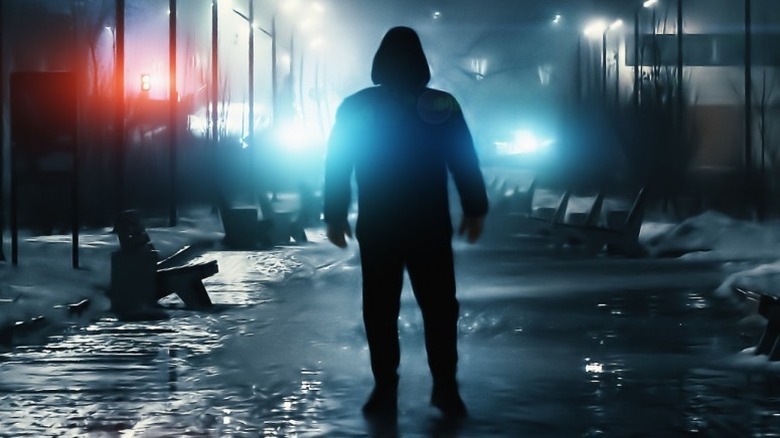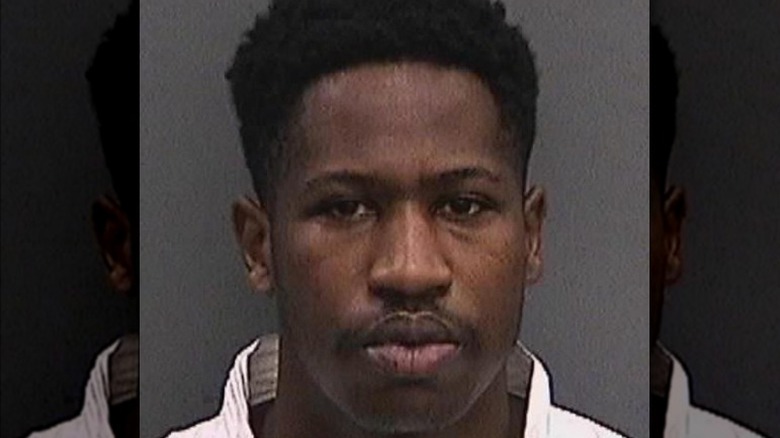The Chilling True Story Behind The Alleged Seminole Heights Serial Killer
The historic Seminole Heights neighborhood in Central Tampa has seen its ups and downs over the years. Built in the 1910s, Seminole Heights was a middle-class haven, attracting residents in droves to live in the newly popular bungalows that the area was becoming known for. Tampa Magazines reports that the community spirit of this neighborhood was strong, and the spirit was hard to shake. The streetcar that connected it with the rest of the city was abandoned in the mid-1940s, as major automotive thoroughfares became an artery leading into the heart of the region.
While the busier streets and construction of the I-275 in the mid-1960s were blamed for the neighborhood's decline through the late 20th century, Seminole Heights emerged from its own down period and entered one akin to a Renaissance as new and popular bars, nightclubs, restaurants, and retail began to open and attract residents and tourists alike. These developments caused the Tampa Bay Business Journal to refer to Seminole Heights as "the next great neighborhood" in 2012 (via Southern Living). But residents of Seminole Heights faced a real fear in the fall of 2017 as a serial killer began an active execution campaign, shooting citizens in a seemingly random pattern of senseless violence. Though many details are still yet to be determined about the motive behind the murders, there are a good number of facts that have been released to the public, and they're quite chilling.
The first two victims were murdered within two days of one another
The Seminole Heights serial murderer claimed his first known victim at noon on October 9, 2017. The victim was later identified as 22-year-old Benjamin Edward Mitchell. Mitchell was killed in broad daylight while he waited to board a city bus to see his girlfriend, according to The New York Times. HuffPost reports that Mitchell was gunned down at the intersection of North 15th Street and East Frierson Avenue by someone who had used a Glock handgun. The killer didn't wait long before striking again. On the morning of October 13, the body of 32-year-old Monica Hoffa was found in a vacant lot. ABC News reports that Hoffa was walking to meet a friend on the evening of October 11 and was last seen alive around 8:45 p.m. Police stated that Hoffa was killed by gunshots and that they believe she died late on October 11 or in the early morning hours of October 12.
Neither victim's body showed any sign of other assault, and robbery was ruled out as a motive. Hoffa's body was found about half a mile from where Mitchell was murdered, and the proximity of the cases sent shockwaves of fear through many of the residents in Seminole Heights. "I'm afraid," Maria Maldonaldo, a mother of one that lives in the area, told ABC News. She told reporters that her fear kept her from allowing her young child to play in the front yard of their home. "We don't open the door or nothing. A lot of people are scared. I'm scared for my son, for the neighborhood," she continued.
Unfortunately for the people in Seminole Heights, the killer was not finished.
Boarding the wrong bus led to one victim's death
Twenty-year-old Anthony Naiboa was en route home from work when he mistakenly boarded the wrong bus. HuffPost reports that Naiboa left the bus at a stop on 15th Street and was gunned down not 200 yards away. According to The New York Times, the young man was walking toward Route 9 so that he could get on the correct bus home. Naiboa, who had been diagnosed with autism, was the oldest of five children. He died at the scene on October 19.
Naiboa's murder happened within several hundred feet of where Mitchell had been murdered 10 days before. ABC Action News reports that police believed at that time that the murders of Naiboa, Benjamin Edward Mitchell, and Monica Hoffa were connected. During a press conference, the media outlet notes that Tampa Chief of Police Brian Dugan told reporters that police "still have no leads, we have no motives. It's clear to me that they're all linked." The killer waited nearly a month before striking again. Then, on November 14, 60-year-old Ronald Felton was walking to meet his church pastor when he was gunned down as he crossed the street. HuffPost reports that Felton was murdered just blocks from a memorial that citizens had erected for the previous three victims.
The suspected killer handed the murder weapon to his boss
On November 28, Howard Emanual Donaldson III gave his manager at McDonald's a paper bag. He told her he was leaving the state and wanted her to keep the bundle for safekeeping. When he left to get money from a local loan office, Delonda Walker examined the contents of the bag and found a firearm (via WTSP). CNN reports that Walker immediately phoned the police, who arrested Donaldson on suspicion when he came back to the restaurant.
When questioned, Donaldson didn't deny that the gun was his. But when pressed about the four recent murders, he denied wrongdoing. He consented to a search of his vehicle, which yielded two clues. The first was that there was clothing similar to those worn by the suspected killer in surveillance footage. The second was the appearance of a dried blood stain on one of the garments. Investigators later learned that his cell phone records put him near the scene of three of the murders. This evidence was enough for prosecutors to charge Donaldson with four counts of first-degree murder. Courthouse News reports that the state was going to seek the death penalty if they could secure a guilty verdict.
Donaldson is facing four separate murder trials
Alleged serial killer Howard Emanual Donaldson III had his attorneys seek a request from the court that wound up delaying the judicial process for quite some time. Though he was set to stand trial in 2020, Donaldson's legal team asked the judge for their client to be tried for each murder separately. His public defenders argued in court that the evidence in one murder might strengthen proof in subsequent murders and not give their client a fair trial. Fox News 13 reports that one of the defenders, Dana Herce, told the court that it was the defense's position that "there is no meaningful relationship that exists between these offenses or these victims." Though the prosecution countered with the argument that all the victims were murdered in the same fashion with the same weapon, the judge sided with the defense. This means four separate trials and four separate juries.
Legal delays and the COVID-19 pandemic have prevented the trial from commencing, though ABC Action News reports that prosecutors will still be seeking the death penalty in each of the four. As of this writing, no dates have been set.
Delonda Walker collected a large reward for Donaldson's capture
It could be said that Delonda Walker risked her safety by turning Howard Emanual Donaldson III in to police after he handed her the gun he allegedly used in four murders. But her efforts did not go without recognition or a financial reward. The Tampa Bay Times reported that Tampa's mayor, Bob Buckhorn, read a brief statement written by Walker at a press conference following Donaldson's arrest. The city leader added his own words, praising Walker and announcing that she would be the sole recipient of a rather large cash reward made available for the alleged killer's capture. Buckhorn stated (via the Tampa Bay Times), "We would not be here today with this killer in custody if it weren't for the courage of one individual who just happened to be working at a local McDonald's." He continued by stating that, though it would take a bit of time to get Walker her well-earned reward, she would be receiving "every penny" of the $110,000 promised.
Walker admitted that she did not know the extent of Donaldson's crimes when he gave her his gun to dispose of. She only gained knowledge that her former employee was an alleged serial killer when members of the press began to arrive at the restaurant she managed. Some of the family members of the victims were also able to meet with Walker, whom they embraced with appreciative hugs. "We hugged her and told her she is our hero," Casimar Naiboa, the father of victim Anthony Naiboa, told the Tampa Bay Times.





